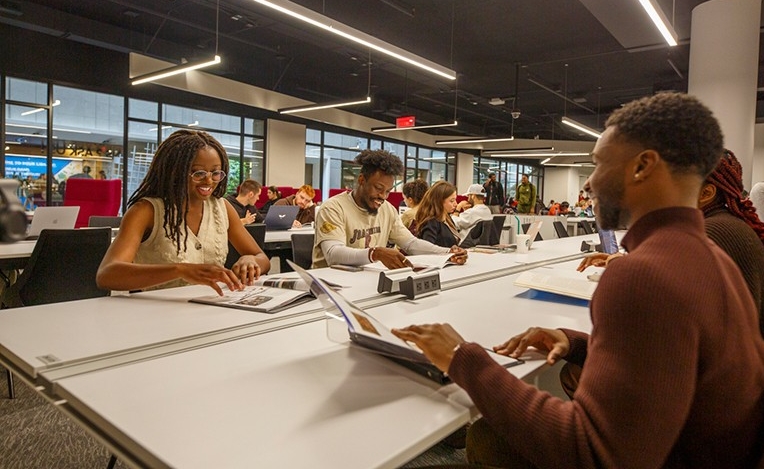The President’s Task Force on Anti-Black Racism at Concordia releases its one-year progress report

The implementation team of the President’s Task Force on Anti-Black Racism has shared a progress report highlighting work accomplished since the launch of its final report in 2022.
The task force was formed in 2020 in response to calls for institutions to do more to combat anti-Black racism following the murder of George Floyd by police in the United States. Its mandate was to oversee and coordinate work needed to achieve concrete change that would address systemic anti-Black racism across the university.
The final report, released in October 2022, made 88 recommendations. It was endorsed by Concordia President Graham Carr and Anne Whitelaw, provost and vice-president, academic.
In May 2023, an implementation team embedded in Concordia’s Equity Office was given the task of advancing, delivering and monitoring the recommendations.
“I am very proud of the work being carried out by the implementation team, advisory committee members and our senior leaders, faculty, staff and students,” says Whitelaw.
“These individuals have taken ownership of task force recommendations as a shared university priority to benefit all Concordians.”
Project Updates
The recommendations in the task force’s final report are categorized into four pillars that align with several of the university’s strategic directions: Driving Institutional Change, Fostering Black Flourishing, Supporting Black Knowledges and Encouraging Mutuality.
“The organizing principle behind our work is shared responsibility and accountability for implementing recommendations across the university, with the many partners and subject-matter experts with whom we’ve partnered,” explains James Roach, the task force’s director of implementation.
“The year 2024 will see us advance many more report recommendations with renewed enthusiasm and deliver concrete responses to systemic and targeted anti-Black racism.”
The progress report provides updates on close to 20 projects. While work continues on projects from all four pillars, some highlights are included below.
1969 commemorative website: The task force’s work prompted an examination of Concordia’s history with Black communities that sparked a reflection on its handling of the 1969 Sir George Williams University student protest.
This reflection led to a formal apology delivered by Graham Carr. The completion of an expanded website, featuring interviews, archival content, a timeline, photos and extensive resources for teaching the events, is one of projects fulfilled in the Driving Institutional Change category, under Public Recognition and Commemoration.
Public art program: A public art program was launched in 2023 to meet another recommendation in the Public Recognition and Commemoration theme. Honouring Black Presence at Concordia is a long-term initiative to celebrate the histories, presence and futures of Black Concordians through the creation of temporary public artworks.
Scholarships: Concordia’s School of Graduate Studies will be offering 10 scholarships for Black PhD candidates in time for the 2024-25 academic year.
Two of these scholarships — the IBET Momentum Fellowships — are available through the Gina Cody School of Engineering and Computer Science and are also open to Indigenous PhD candidates. The Black Student Excellence Doctoral Entrance Award scholarships have also been created for Black PhD candidates from the Faculty of Arts and Science, Faculty of Fine Arts, John Molson School of Business and School of Health.
“One of our main priorities at the School of Graduate Studies is ensuring all students receive the resources they need to succeed in academia,” says Faye Diamantoudi, dean of graduate studies.
“This funding is integral to our goal of increasing diversity and representation at Concordia for the benefit of the community as a whole.”
Mental health support and services: Student Community and Academic Thriving is another focus area in the recommendations, under the Black Flourishing pillar. To ensure access to mental health services that are grounded in anti-racist and equity-centred frameworks, the university’s Campus Wellness and Support Services (CWSS) staff received training focused on advancing mental health support for Black Concordians.
CWSS includes the Health Services Clinic, the Access Centre for Students with Disabilities and Counselling and Psychological Services.
Infusing Black Scholarship in Curriculum: This project aims to provide support and resources that will help faculty integrate Black scholarship in curricula and offer students an education that is inclusive of Black peoples’ experiences, perspectives and realities. This is one of the projects identified under the Supporting Black Knowledges pillar, under Research and Scholarship.
An initial pilot was completed in summer 2023, and a call for the next cohort of faculty will take place in early 2024.
The task force website has been updated to reflect the transition to implementation and includes the one-year progress report of activities.
“I encourage Concordians to review the progress report and take a moment to reflect on individual and collective ways to enact concrete changes in their respective areas of the university,” says Lisa White, executive director of the Equity Office.
“Everyone has a role to play in ensuring that our campus is inclusive, welcoming and equitable.”
Learn more about the implementation of the President’s Task Force on Anti-Black Racism recommendations and programming offered by the Black Perspectives Office at Concordia.


